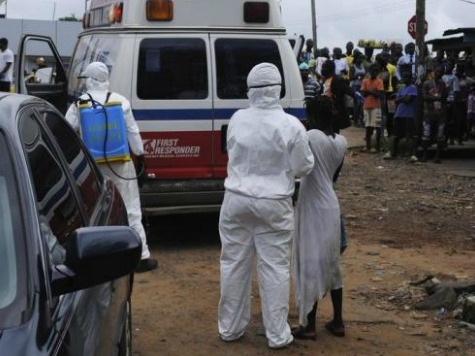Family members of an Ebola victim in the devastated town of Jene-Wonde, Liberia, report that they are being denied food and water by villagers as part of their quarantine. Alice Massally, a member of the family, tells FrontPageAfrica the denial of food began because her deceased father refused humanitarian aid.
In a report on the family of 27, FrontPageAfrica notes that the father of the family rejected World Food Programme resources, claiming that “it was Ebola food and bad for his family.” Residents claim the father lied about having Ebola, and since his death, the family has been ostracized. They have been banned from the community water well without supervision and denied any food that enters the impoverished village. Says Massally, one of the man’s daughters, “Since they quarantined us, they don’t give us food or water and we’re just sitting here, we can’t go anywhere.”
A family member who is nine-months pregnant tells the newspaper she does not expect to have any access to obstetrics care for her birth. The family only feeds itself through help from a friend who lives thirty miles away.
Fifty-five people in Jene-Wonde remain under quarantine, and the situation has become increasingly more critical as time has gone by. Jene-Wonde stands out among Liberian towns as one that has continued to suffer the vestiges of the Ebola outbreak without having the numbers improve significantly. The town had been removed from the outbreak for much of its spread through Liberia. It received its first case, a traveling schoolteacher, in September, and the spread of the disease has since accelerated.
The news of the outbreak accelerating in Jene-Wonde significantly undermines global health organizations’ claims that Liberia has almost fully defeated the Ebola virus. The World Health Organization (WHO) announced this month that objectives to stop the spread of the disease–namely that 70% of those contaminated be provided medical care and 70% of the dead be buried safely–had been achieved in Guinea. Some reported this as a success, despite the WHO not meeting those objectives at all in Sierra Leone and only halfway in Liberia.
The organization’s latest estimates place the number of Ebola victims worldwide at 17,000, with more than 6,000 dead. Six hundred new cases were reported in the last week of November alone.

COMMENTS
Please let us know if you're having issues with commenting.